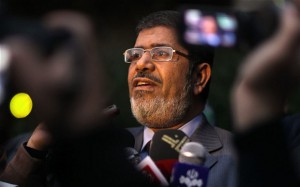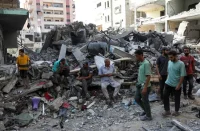The government forces are gaining ground almost everywhere in Syria. Their advance has become an important international game changer. The anti-government camp has become vibrant applying efforts to rescue the giant international project, which has already consumed so much time and effort. President Obama has approved arming Syrian rebels. The supplies are to go through Turkey and Jordan. US special operations forces concentrate in Jordan under the pretext of taking part in exercises. Speaking at the G8 summit, British Prime Minister David Cameron said Bashar Assad had to go launching a manhunt for the Syrian leader.
 Mohamed Morsi, the current President of Egypt, has suddenly started to ride the wave of anti-Syrian activities. He has recently called the National Conference for the Support of the Syrian Revolution and strongly condemned the Syrian government in his Cairo speech. More important – President Morsi has backed a no-fly zone over Syria. Like if reading an instruction from the US Central Intelligence Agency he said:
Mohamed Morsi, the current President of Egypt, has suddenly started to ride the wave of anti-Syrian activities. He has recently called the National Conference for the Support of the Syrian Revolution and strongly condemned the Syrian government in his Cairo speech. More important – President Morsi has backed a no-fly zone over Syria. Like if reading an instruction from the US Central Intelligence Agency he said:
«The Egyptian people supports the struggle of the Syrian people, materially and morally, and Egypt, its nation, leadership … and army, will not abandon the Syrian people until it achieves its rights and dignity… The people of Egypt and its army will not leave Syrians until their rights are granted and a new elected leadership is chosen».
Mr. Morsi made public his decision to sever diplomatic ties with Damascus and the plans to provide the support for the opposition till the end of conflict. He also lashed out against the intervention of Hezbollah in the Syrian conflict. The speech was greeted with the slogans calling for Assad to step down and no Sunni blood to be shed anymore. After the Morsi’s address, Internet posts have appeared saying the events corroborate the suspicions popped up long ago that the Egyptian leader had ties with the Central Intelligence Agency. The Syrian information agency cited an anonymous Egyptian government official who said the call to enforce a no-fly zone over Syria is a violation of Syria’s sovereignty that meets the interests of Israel and the United States.
The Morsi’s stance is also explained by reasons related to the situation inside the country. The ratings of Muslim Brothehood and the President are going down. The promise to establish law and order in the country once Mubarak is gone remains unfulfilled. The growing public discontent is reflected by the plans to organize an anti-government rally on June 30, the day Morsi took office. The Tamarod (rebel) grass roots movement rapidly picked up steam, and organizers said they have collected millions of signatures demanding that Morsi quit, leaving the government jittery and energizing the fragmented opposition. The movement activists say the goal is to gather 15 million signatures and online registrations by 30 June 2013 (which is the same date that the President was sworn into office in 2012) or one million more than the number of votes for Morsi during the presidential election. The anti-presidential protests are supported by public organizations, including popular ones, like, for instance, the April 6 Youth Movement.
No way the Egyptian regime underestimates the threat coming from the possibility of new internal upheavals. The border crossings are announced to be closed soon, the control over airports and railway stations is to be strengthened, the armed forces and police are on high alert.
At the same time, thousands of Egyptian Salafis are recruited to join the “Syrian front”. Like if upon a command, mass meetings were held where the religious leaders lambasted Syria the day before the Morsi’s address. Muhammad al Arifi, a cleric from Saudi Arabia, called upon the Egyptian Sunnis to launch a jihad against Bashar Assad. One day earlier the Coordinating Council of Muslim Organizations convened in Cairo. Representatives of several Sunni religious organizations discussed the situation in Syria, which resulted in the conference’s call to support jihad in the war-torn country.
It all goes to show that those in the West who intend “to swallow” Syria have launched an emergency reserves mobilization trying to convert the conflict into the Sunni-Shia war spilling over one state boundaries. The fact is confirmed by the response of Hassan Nasrallah, the leader of Shia Hezbollah, who vows continued support for Syria no matter its enemies will get US weapons. It has already been reported the Shia combatants from Iraq are joining Hezbollah, Iran has announced plans to deploy 4000-strong Revolutionary Guards (specially trained to counter terrorists) to Syria.
Those who support a direct intervention into the conflict strike the keynote of Washington and Brussels’ stance on Syria. The militarily intervention will continue to be discussed for some time. It will stop as soon as rebels will flee the country under the strikes of Syrian army. Then the West will have to take a decision. Not much time is left…
Source: Strategic Culture Foundation














All hell is about to break loose in the Middle East. This can only be avoided if China and Russia can take the lead in preventing this pending all out conflict. The conflict will involve Shias from Iran, Iraq, Pakistan and Lebanese Hezbollah. It will most likely engulf the entire Middle East.
The conflict is not in the interest of the US, EU and Canada but rather one that is in the interest of Israel as it is using the western/ NATO powers to cut off Syria from Iraq (the conduit between Iran and Hezbollah) in the east and Hezbollah (supporting Iran) in the west.
I fear that the war is going to start very soon and it will engulf civilizations. The Shia power is being under-estimated by the entire world.